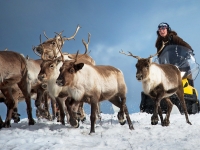Sámi Fight Iron Mine in Reindeer Country

This past Christmas, while children around the world wrote letters to Santa Claus whom they believed would deliver presents to them in a sleigh drawn by the mythical Rudolph, the actual human companions of the Arctic reindeer spent their holidays worrying about Beowulf, a British mining company.
Beowulf, based in Cambridgeshire, won permission in late August to dig for iron near the town of Jokkmokk in northern Sweden. The planned Gállok mine is expected to disrupt the migration path of the reindeer, which are brought down from the northern mountains every winter by the indigenous Sámi people to graze in the lowlands.
Gállok will not be the first mine to interrupt this centuries old tradition - the Kiruna and Roennbaeck mines have already disrupted reindeer grazing in northern Sweden, together with other encroachments of modern society. Some 1,200 reindeer were killed in one season alone by passing trains.
"Our biggest fear is that the mine with its connecting infrastructure would effectively cut off our possibilities of migrating to our winter pastures; and also the mine itself is where we have part of our reindeers in wintertime so we fear that we will not be able to continue reindeer herding in this area" Jonas Vannar, a Sámi reindeer herder, told Al Jazeera.
"We have clean water here," Ulla Forsberg, a resident of Bjorkholmen, a village situated just over a mile from the proposed mine, told the TV channel. "We can drink the water from the lake - and there's not many places in Sweden [where] we can drink water from the lake. All people in Bjorkholmen are sad because they don't want to have a mine here."
"There's no way our reindeer herding will be able to continue," Niklas Spik, a spokesman for the Jaahkaagasska Sámi community told Agence France Press (AFP) news agency.
The company disagrees. "This is a very solid and large ore find, and the economic value of this weighs more than the local reindeer herding business," Fred Boman, CEO of British Beowulf subsidiary Jokkmokk Iron Mines, told AFP. "But (reindeer herding) has important cultural value, and we are absolutely convinced that we can get on with this together."
"It is very provocative that vague descriptions and pure speculations about possible financial advantages for a mining industry should be decisive and outweigh Sámi traditional rights," wrote a group of Sámi leaders in a statement of protest after the Swedish government approved the mining permit, noting that Beowulf did not have the best corporate record. "The project is carried out by a company risking bankruptcy and which is under investigation for economic crime as well as has halted trading on the Stock Exchange."
Local politicians are frank about the reasons that they support the mine. "There's a lot of money in the area," Sven-Erik Ãsterberg, the county governor, told Al Jazeera. "And of course you know what - money talks."
Many in the local community are unhappy. "The Swedish government has abandoned us," Henrik Blind, a Sámi spokesman and local politician, told Barents Observer. "For us mining is an existential question. Reindeers don't eat stone. Neither can they migrate from winter to summer grazing land when there is an opencast mine blocking the way."
Over the past year, Blind led other Sámi residents and environmental activists to stage protests and road blockades against the mine. On one occasion an activist poured gasoline over his body and threatened to set himself on fire.
"We have compromised, we have tried dialogue, but nobody is listening to us. Civil violence is our last chance of being heard", says Blind.
- 183 Environment



